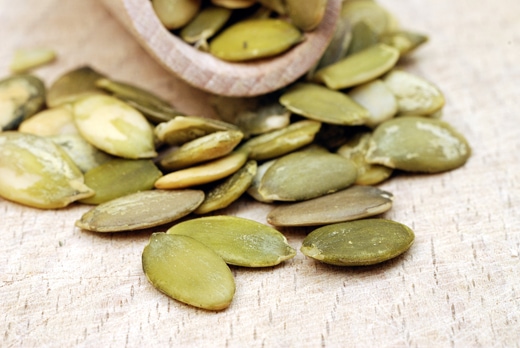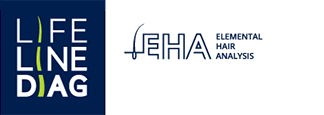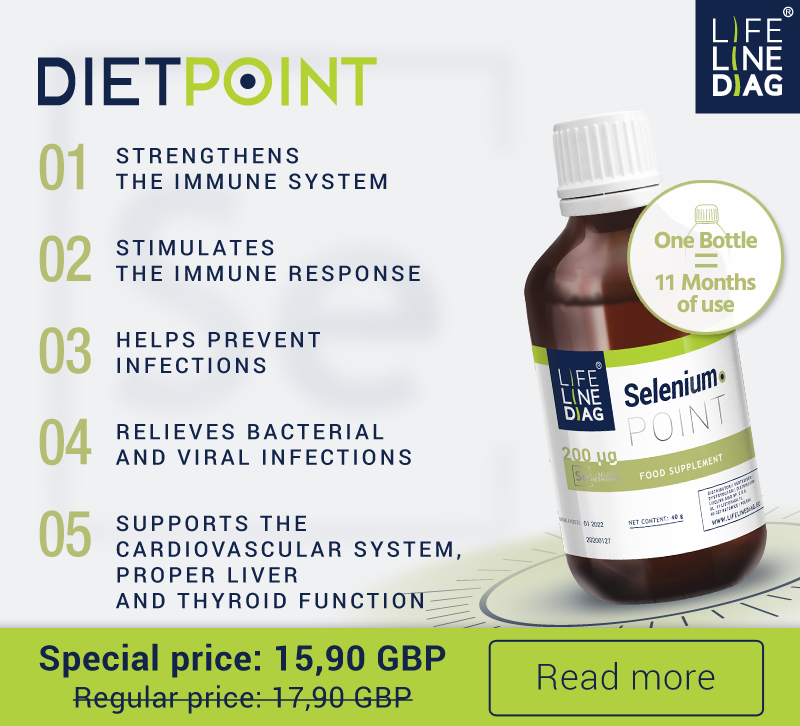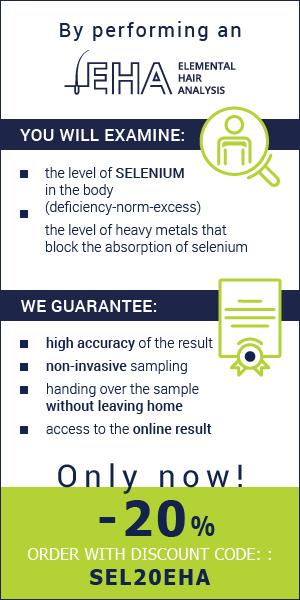
Our body needs a small amount of selenium – just 50 micrograms per day. However, this doesn’t mean that it can be overlooked in the daily diet. A lack of selenium can have serious effects, such as depression and poor immunity. The right amount in the diet, on the other hand, prevents many serious diseases.
Selenium’s role in the body
Selenium was discovered in 1817 by the Swedish chemist Jöns Berzelius. Scientific research has confirmed the effectiveness of selenium in the fight against oxidants, as well as prevention of heart attacks and cancer (especially prostate cancer). Its mood-improving and anti-depressant effects also shouldn’t be overlooked.
Selenium is found in every cell of the body. The highest concentration is in the renal cortex, pancreas, pituitary gland and liver. It’s essential during enzyme production. The most-important function it performs is the formation of the enzyme glutathione peroxidase, which is an antioxidant. This substance is responsible for protecting red blood cells and cell membranes against the damaging effects of free radicals. Selenium also protects the heart against the harmful effects of oxidants. This mineral is necessary for the proper functioning of the immune system and thyroid. It also protects against rheumatoid arthritis and helps to alleviate this disease by reducing the amount of harmful substances that contribute to it.
Selenium and immunity
A selenium deficiency can cause many changes in the human immune system, the most important of which is suppression of the immune response to a bacterial or viral infection. Deficiency in selenium leads to quantitative and functional disruption of lymphocytes and other cells of the immune system. Research conducted in recent years has confirmed that the administration of appropriate doses of selenium stimulates the body’s defence response. How does selenium work and why can it be an effective weapon for the immune system?
As early as 1973, it was discovered that selenium plays a key role in the creation of glutathione peroxidase and other enzymes whose main function is to protect cells against oxidation due oxidative stress. However, increased oxidative stress caused by selenium deficiency is the likely cause of increased progression of infection and weakened immune defence. Thus, it was proven that selenium is essential for maintaining proper immunity and plays a very important role in the prevention of, among others, viral infections.
Studies have shown that people infected with viruses have low selenium levels. This applies both to those who are HIV carriers or have HBV, and those infected with influenza viruses or the Epstein-Barr virus with oncogenic properties.
Selenium supplementation administered for several years inhibited the development of HBV infection and reduced the incidence of primary liver cancer in China, where infection with this virus in the 20th century took on endemic proportions (meaning that it occurred there for many years and remained at a similar level).
The case is similar with the HIV virus – selenium deficiency causes a decrease in the body’s immunity and increases the risk of infection. In patients already infected with this virus, a gradual decrease in selenium levels was found to be in direct proportion to the development of subsequent stages of infection. Patients with AIDS also have lower levels of this element. This is probably one of the reasons that the AIDS epidemic in Senegal slowed down, as the selenium content in the natural environment is high. In neighbouring African countries that are deprived of larger, natural sources of selenium, AIDS has become a major contributor to mortality.
In the light of recent events and in relation to the role played by selenium deficiency in viral infections, SARS should also be discussed, the virus that causing the severe respiratory syndrome, which resulted in a wave of cases and 775 confirmed deaths. Regarding the role played by selenium deficiency in viral infections, it’s worth noting that SARS was first detected in China in the central part of the country, in the Chinese province of Guangdong, i.e. in an area with significant selenium deficiency in the environment. The events of 2020 are also a good reminder of the important role of selenium in maintaining a well functioning immune system.
Top up your selenium levels – look after your immune system – look after your health
Elements other than selenium that also affect the body’s immunity are cobalt, sodium and potassium. And the diagnostic method that allows you to determine the level of these elements and obtain a full picture of the body’s immunity level is EHA – elemental hair analysis.
Do an EHA test today and check your levels of elements essential for your immunity
Selenium – an antioxidant
Selenium slows down ageing. It helps prevent cell damage, which means that every organ and every cell of the body is protected. In this way, the mineral helps reduce the risk of cancer, heart disease and cardiovascular disease.
How much the body needs
Selenium is called a micro or trace element, because the body only needs a very small amount. Approximately 50-60 micrograms is enough to cover daily needs.

In the fight against depression
A selenium deficiency results in increased nervousness, the blues, and in extreme cases even depressive states. Scientific studies conducted by American psychologists have shown that people who are deficient in selenium are less brave, more likely to feel tired, and have a worse mood. There was a rapid and noticeable improvement in mood in the group studied after a dietary change. The impact of selenium on the psyche is most likely related to its antioxidant properties, thanks to which it improves blood flow to the brain and the efficiency of the cells of the nervous system. It has also been found that incorporating more selenium into the diet is beneficial for people suffering from Alzheimer’s disease.
Selenium in the protection of masculinity
In men, half of the selenium accumulated in the body is found in the testes, sex glands and semen. Selenium plays an important role in maintaining a man’s sexual function. It has been proven to increase the number of sperm and improve their motility. It was recently discovered that selenium can prevent the development of prostate cancer. Scientists have found that men with the lowest selenium levels have twice the risk of prostate cancer as those with high levels. The highest safe dose of this mineral – one that would provide maximum help without causing toxic effects – has not yet been established.
Deficiency
Serious selenium deficiency results in increased susceptibility to cancer, as well as heart and cardiovascular diseases. As the concentration of selenium decreases, so does immunity. The first symptoms of insufficient amounts of this mineral are pallor, muscle discomfort, joint problems, brittle nails, visible signs of ageing, poorer brain function, blurred vision and increased susceptibility to infection. These are followed by heart damage, hypothyroidism, bone diseases and cancer. A deficiency in pregnant women can cause irreversible foetal changes.
Sources
The amount of selenium in food is related to its concentration in the soil in which the plants grew or on which the animals grazed. Sources of selenium include wheat, rice, oats, pumpkin seeds, poultry, and lean meat. A daily dose of the mineral is found in four eggs, 50 g of wheat, 2.5 cups of rice (white or brown), 100 g of mussels, 70 g of smoked oysters, 80 g of sunflower seeds, six slices of white bread, 110 g of oat bran, 110 g of wheat meal, or 70 g of chicken liver.
Selenium absorption
The fact that the mineral will be provided in food doesn’t mean that our body will absorb and use it. The absorption of selenium is better if the diet is rich in proteins and vitamins E, A and C, and hindered by sulphur and heavy metals. Unfortunately, people have daily contact with the latter due to environmental pollution. The heavy metal load of the body and more dietary tips can be found in an elemental hair analysis EHA and the attached report.
A great way to provide the body with the right dose of selenium is by taking the dietary supplement Selenium.Point. This product contains the best form of selenium in liquid form, which facilitates its absorption. The high concentration of selenium makes it cost efficient. A small amount is enough to cover the daily requirements for this element.
Who should take selenium?
As with all minerals and nutrients, everyone should ensure correct selenium levels. An increased demand for this element appears in people who have problems with the absorption of nutrients, patients fed parenterally and those who have undergone bowel surgery. An additional (small) amount of selenium will be useful for people with poor mood.
Excess
Be careful! Taking too much is never advisable. An excess of selenium decreases the concentration of minerals such as magnesium, manganese and copper, which are essential for the body’s functioning. A selenium overdose causes hair loss, brittle nails, skin changes, irritation, fainting, diarrhoea, nausea and abdominal pain. While the body’s accepted daily intake is 400 micrograms, you shouldn’t exceed the daily norm (55-60 micrograms).
Did you know that…
Research is being conducted into the effects of selenium on improving the health of AIDS patients. The disease attacks the immune system, so a mineral that strengthens it can help relieve symptoms and delay its development.
If you want to take care of your health and find out how much selenium your body has, you should do an elemental hair analysis.
Lifeline Diag















